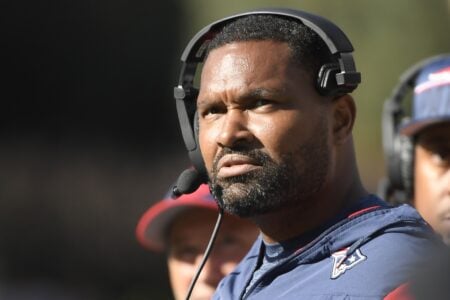- Joined
- Feb 10, 2005
- Messages
- 33,095
- Reaction score
- 22,713
Here's an analysis by economists on why the Pats have sustainability as a winning franchise...
http://american.com/archive/2006/november/patriots-vs-redskins
Football teams have a relatively simple economic problem to solve. They have to fill their rosters with players, and have to pay the entire collection of players an amount fixed by the league. They can add players in two main ways: sign veterans as free agents or hire new players out of college in a league-wide draft. Veteran free agents get a salary set in the free market. Most draftees receive a relatively lower salary set by collective bargaining. What they are paid depends on the round in which they are drafted.Economics has a very clear prediction for optimal team behavior. Firms should load up on draft picks, especially from the inexpensive late rounds. Every team has the same cumulative salary to pay, so, to outperform the other teams, you must receive higher value relative to salary from your players than your opponents receive from theirs. If, for example, you select a Pro Bowl (all-star) receiver in the fifth round of the draft, that player may well receive a salary one-tenth that of a veteran Pro Bowl receiver of roughly equal talent who has had his salary set on the market. So your team gets a huge surplus.
It is nearly impossible to derive surplus from the veteran free-agent market, since you are paying market wages. While injuries and emergencies might require some veteran signing, the draft is the only place to build a winning team.
So economics would predict that teams would uniformly put an enormous effort into perfecting their drafts, and avoid sinking excessive dollars into costly free agents. In fact, this model predicts very well the behavior of one team, the New England Patriots. Their head coach, Bill Belichick, who received his undergraduate degree in economics from Wesleyan University in Connecticut, has been an artist at squeezing value-added out of his draft picks, and has won three of the last five Super Bowls.
We all know the fallibility of BB and Pioli in bust draft picks (e.g. Marquis Hill - Thanks Saban, you devious bastid!) but in the average and over the long run they have done very well, value wise.
http://american.com/archive/2006/november/patriots-vs-redskins
Football teams have a relatively simple economic problem to solve. They have to fill their rosters with players, and have to pay the entire collection of players an amount fixed by the league. They can add players in two main ways: sign veterans as free agents or hire new players out of college in a league-wide draft. Veteran free agents get a salary set in the free market. Most draftees receive a relatively lower salary set by collective bargaining. What they are paid depends on the round in which they are drafted.Economics has a very clear prediction for optimal team behavior. Firms should load up on draft picks, especially from the inexpensive late rounds. Every team has the same cumulative salary to pay, so, to outperform the other teams, you must receive higher value relative to salary from your players than your opponents receive from theirs. If, for example, you select a Pro Bowl (all-star) receiver in the fifth round of the draft, that player may well receive a salary one-tenth that of a veteran Pro Bowl receiver of roughly equal talent who has had his salary set on the market. So your team gets a huge surplus.
It is nearly impossible to derive surplus from the veteran free-agent market, since you are paying market wages. While injuries and emergencies might require some veteran signing, the draft is the only place to build a winning team.
So economics would predict that teams would uniformly put an enormous effort into perfecting their drafts, and avoid sinking excessive dollars into costly free agents. In fact, this model predicts very well the behavior of one team, the New England Patriots. Their head coach, Bill Belichick, who received his undergraduate degree in economics from Wesleyan University in Connecticut, has been an artist at squeezing value-added out of his draft picks, and has won three of the last five Super Bowls.
We all know the fallibility of BB and Pioli in bust draft picks (e.g. Marquis Hill - Thanks Saban, you devious bastid!) but in the average and over the long run they have done very well, value wise.


















